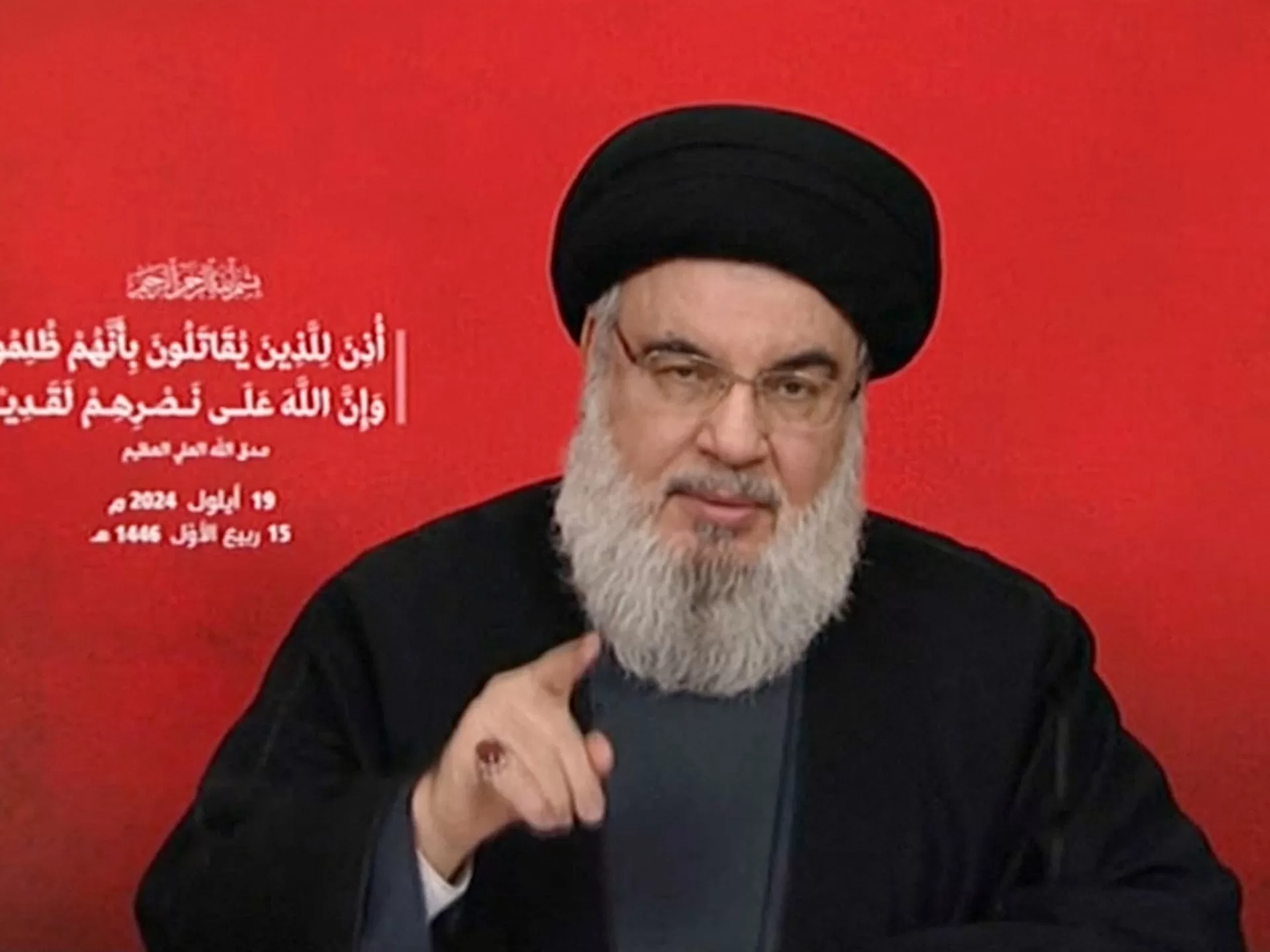Hezbollah leader Hassan Nasrallah says the pager and walkie-talkie attacks against its members in Lebanon and Syria this week crossed “all red lines” and the group will retaliate and is undeterred in its fight against Israel in support of Palestinians in Gaza.
In his first televised speech since the unprecedented attacks, which took place over two days and killed at least 37 people, Nasrallah on Thursday called them a “big blow in terms of security and humanity” but said they have failed to bring the group to its knees.
The blasts, which the Iran-backed group blames on Israel, wounded more than 2,900 people, of whom 287 are in a critical condition, and have heightened fears that 11 months of near-daily exchanges of fire between Hezbollah and Israel will escalate into all-out war.
In keeping with many previous attacks, Israel has yet to admit responsibility or comment on the blasts.
In recent weeks, Israeli leaders have stepped up warnings of a potential larger military operation against Hezbollah, saying they are determined to stop the group’s fire to allow tens of thousands of Israelis to return to homes near the border with Lebanon.
As Israeli jets carried out sonic booms over Lebanon during his speech, Nasrallah called Tuesday’s and Wednesday’s simultaneous explosions a “terrorist act” and a “declaration of war” against the people of Lebanon and the country’s sovereignty.
He conceded the attacks were “unprecedented in the history of the resistance movement in Lebanon” as well as “in the history of our country” and “our enemy”.
But Nasrallah said Hezbollah would continue supporting Palestinians in Gaza “no matter what the consequences are, what the sacrifices are, what scenarios will unfold”.
“From October 8 until now, the Israeli forces did not pull out any of their military personnel in the north,” the Hezbollah leader said in the speech, warning that Israelis who have evacuated from the area would not be allowed to return.
He said the devices exploded inside hospitals, markets, homes and several areas where civilians were present and Israel had “wilfully” targeted 4,000 pagers and 1,000 walkie-talkies with the aim to kill as many people as possible.
He added that some of the attacks took place in hospitals, pharmacies, marketplaces, commercial shops and even homes, private vehicles and on public roads where thousands of civilians, including women and children, are present.
Nasrallah also stressed the assaults were partially foiled as “many devices were out of service, turned off [or] kept away”.
He added that what happened did not impact the group’s command, control or infrastructure.
“I reassure you our infrastructure has not been touched,” he said.
Hezbollah and Israel have been engaged in a mostly low-level conflict since Israel launched an assault on Gaza on October 7, which has killed more than 41,000 Palestinians.
In late July, Israel killed Hezbollah commander Fuad Shukr in Beirut and Hamas’s political leader Ismail Haniyeh in Tehran almost simultaneously, triggering fears of an escalation.
Al Jazeera senior political analyst Marwan Bishara said there will likely be further escalation in the coming days or weeks as Hezbollah responds to the attacks.
“He is down, but he is defiant,” Bishara added, referring to the Hezbollah leader. “[But] it’s a major blow to Hezbollah. There is no doubt about that.”
Al Jazeera’s Ali Hashem, reporting from Lebanon, said ultimately there was “nothing revealing” about how Hezbollah might respond to the attacks.
“After Nasrallah’s speech, we don’t know what’s really going to happen,” he said.
“But at the same time, there was something that felt ambiguous when he spoke about keeping the accountability or the retaliation within a very small circle. I think he spoke about the investigation within the organisation, within Hezbollah.”
Analyst Sultan Barakat pointed out that Nasrallah did not give any clear indication how the group would retaliate.
“We have an answer from him that he’s definitely going to come back but without saying when and how,” Barakat, a professor of public policy at Hamad Bin Khalifa University in Qatar, told Al Jazeera, adding that the speech aimed to present a “partial win” for Hezbollah.
Meanwhile, two Israeli soldiers were killed and several injured in attacks by Hezbollah in northern Israel on Thursday.
The Israeli army also announced new attacks on Hezbollah targets in Lebanon “to degrade Hezbollah’s terrorist capabilities and infrastructure”, adding in a statement that it was part of efforts to return displaced Israelis to their homes in the north.
